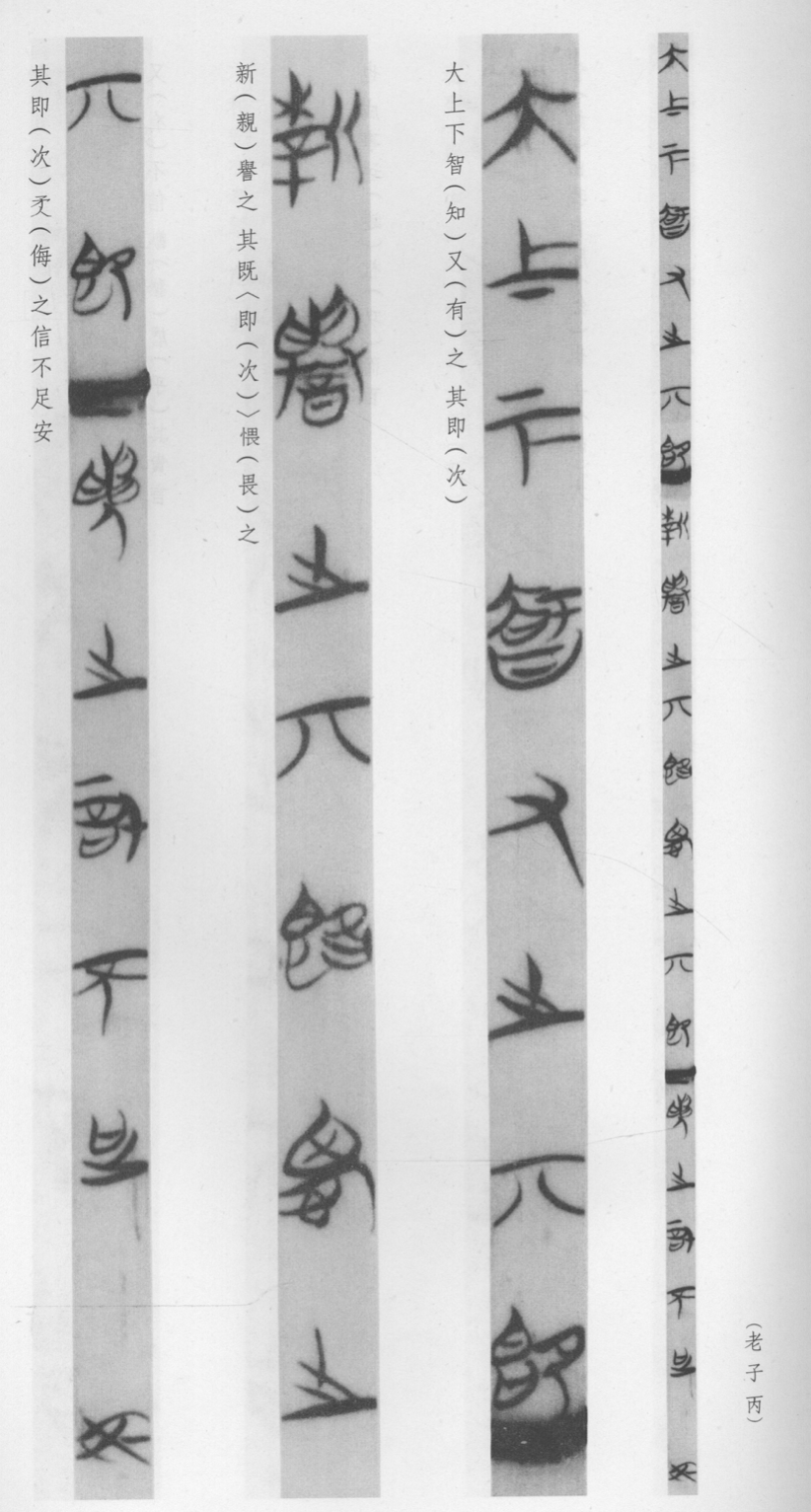In this eassy I will compare two Laozi texts, one from Beida bamboo slips and the other from Guodian counterparts.
I will start with Beida Laozi, of which my reading transcription and the corresponding translation is:
太上,下知有之。其次,親譽之。其次,畏之。其下,母之。信不足,安有不信。猶乎其貴言。成功遂事百姓,曰:我自然。故大道廢,安有仁義。智慧出,安有大偽。六親不和,安有孝慈。邦家昏亂,安有貞臣。絕聖棄智,民利百倍。絕仁棄義,民復孝慈。絕巧棄利,盜賊無有。此三言以為文未足,故令之有所屬。見素抱樸,少私寡欲。
The highest rulers, common people know that they exist. In a lower level, common people love them and praise them. In a lower level, they fear them. In a lower level they humiliate them. The trust is not enough, so the distrust grows. They are hesitating because their words are important. If they are successful, they would serve and tell the common people: "I just let nature take its course." So when the great way was abolished, the benevolence and righteousness show up. When the wisdom comes out, the huge fakeness appears. When the six kinships are not harmonious, filial piety appears. When the states are in chaos, loyal ministers appear. Cut off sageness and discard the wisdom, and it would benefit the people a hundred times. Cut off the benevolence and discard the righteousness, the people would again become filial and kind. Cut off the crafts and discard the profits, there would be no thieves or robbers. The three methods are in consideration of inadequate texts. This is where the government decrees belong to: see the plain and hold the simple, reduce selfish motives and lessen the lusts.

Figure 2: Laozi Bamboo Slip from Guodian Tomb in 4th century
For Guodian counterpart, my reading transcription and translation go as:
太上,下知有之。其次,親譽之。其次,畏之。其次,母之。信不足,安有不信。猶乎其貴言也。成事遂功而百姓曰:我自然也。故大道廢,安有仁義。六親不和,安有孝慈。邦家昏□,□有正臣。絕聖棄智,民利百倍。絕巧棄利,盜賊亡有。絕偽棄慮,民復季子。三言以為辨未足,或命之或呼屬。視素抱樸,少私寡欲。
The highest rulers, common people know that they exist. In a lower level, common people love them and praise them. In a lower level, they fear them. In a lower level they humiliate them. The trust is not enough, so the distrust grows. They are hesitating because their words are important. They finish things successfully, but the common people would say: "I just let nature take its course." So when the great way was abolished, the benevolence and righteousness show up. When the six kinships are not harmonious, filial piety appears. When the states are in chaos, (?) loyal ministers appear. Cut off sageness and discard the wisdom, and it would benefit the people a hundred times. Cut off the crafts and discard the profits, there would be no thieves or robbers. Cut off the fakeness and discard the deliberation, the people would become infants again. The three methods are not clarified enough. So either order or appeal: see the plain and hold the simple, reduce selfish motives and lessen the lusts.
In my opinion, there are two major differences between the two versions.
.1 The speaker of the sentence "I just let nature take its course" Both texts originally have no punctuation marks. So the speaker of the sentence depends on where to punctuate. For Guodian counterpart, the question is easier to solve because there is a "but" 而before common people 百姓. Therefore, the speaker of "I just let nature take its course" is and can only be the common people. The rulers don't say too much about politics so the common people thought everything happens naturally. However, in Beida Laozi, the text without punctuation is 成功遂事百姓曰我自然. If the speaker is the common people, we are considering 成功遂事 as a phrase. Also there is no contrast 而 before common people. However, 遂事百姓 reads more natural to me. The rulers are hesitating and they value their words. If the strategy is successful, the rulers can use it to serve the common people and say: I just let nature take its course. In this way, it fits Laozi's idea about "governing by noninterference".
.2 Wisdom and fakeness Guodian counterparts don't have the sentence about wisdom which appears in Beida Laozi: When the wisdom comes out, the huge fakeness appears 智慧出,安有大偽. And an interesting discovery is that it is the Guodian counterparts that mention cutting off fakeness later in the text. And I choose to read 絕偽棄慮民復季子 (cut off the fakeness and discard the deliberation, the people would become infants again) rather than 民復孝慈. Because I think the status of infants is carefree and without worries, which is coherent with discarding the deliberation.
© EmilyueRSS